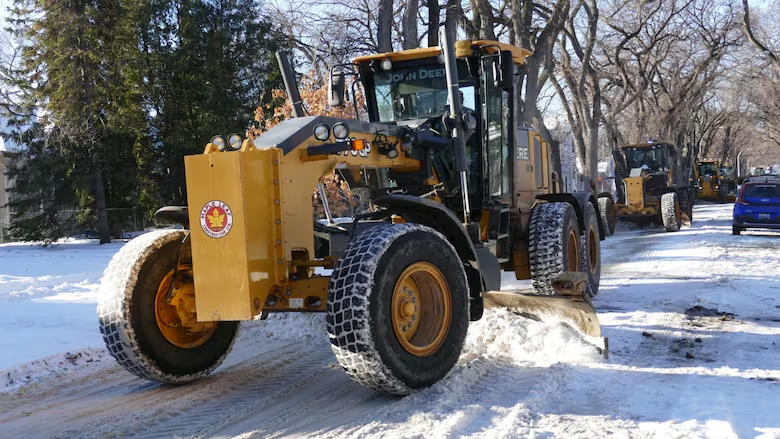City to kill unpopular plan to limit residential snowplowing in Winnipeg
Proposal was to plow residential streets only after 15 cm of snow fell, instead of 10 cm

A pilot project that would have seen the City of Winnipeg wait for more snow before plowing residential streets is being scrapped.
"We've heard loud and clear from the public on this," Mayor Scott Gillingham told CBC Manitoba's Information Radio host Marcy Markusa on Thursday morning.
"My office has had more emails and calls about the snow-clearing pilot proposal than we have about the property tax increase. Winnipeggers really want us to keep our snow-clearing at the current level and so today, Coun. Janice Lukes in her public works committee meeting will be bringing a motion to cancel the pilot project.
"I support her in that, so there will not be a pilot project that starts next fall."
The project — which was set to start in fall 2025 — was proposed in the draft of Winnipeg's 2025 budget and unveiled in early December.
The city wanted to see if it could save money by waiting for 15 centimetres of snow to fall on residential streets before plowing begins. The current threshold is 10 centimetres.
It planned to run the project for one snow-clearing season, winter 2025-26, and then evaluate whether it led to any significant savings.
"If it works great, and the feedback comes back positive, then we'll look at the next steps of identifying maybe changes to the policy," Gillingham said back in December.
There were estimates that the savings might equate to one citywide snow-clearing operation per season. As soon as it was announced, the idea was panned by Winnipeggers, who not only worried about those with limited mobility trying to get around, but also emergency vehicles getting stuck on side streets.
Gillingham, on Thursday, said the public works department, "like all other departments" will need to be responsible to find other cost savings and control costs in order to reign in its deficit.
Lukes says she always thought the plan was a bad idea.
"The feedback that really resonated with me was the concern of the public [about] mobility issues on streets where there's no sidewalks or pathways," Lukes said.
"Because people have to use streets. We will never be able to afford a sidewalk or a pathway on every street in the city of Winnipeg."
Disability advocate Melissa Graham told CBC News she's glad the city listened to the concerns of the community.
"Even though they were saying it wasn't impacting sidewalks, you still need to cross streets to get between sidewalks," she said. "So we were worried that would really impact mobility and accessibility for our community."
Mark Cohoe of Bike Winnipeg also praised the decision.
"Keeping people active, getting them walking, biking, busing, is a savings to our city," Cohoe said.
The latest budget update shows the city expects to overspend its budget in 2024 by $20.5 million.
The difference is largely due to less tax money coming in from new building construction and renovations than what the city had expected.
With files from Cameron MacLean and Marcy Markusa
